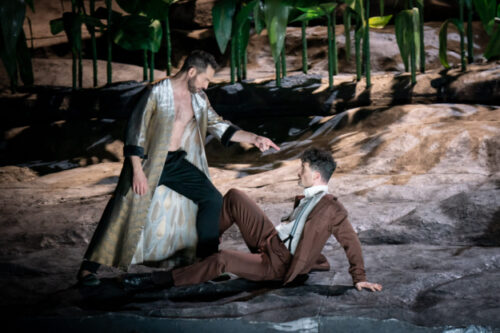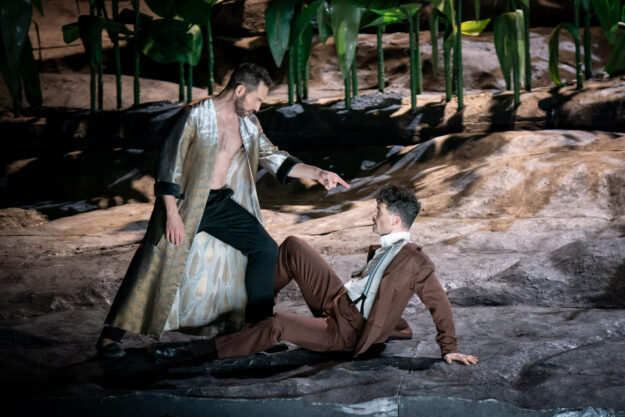 Austria Mozart, Don Giovanni: Soloists, Chorus (chorus director: Thomas Lang) and Orchestra of the Vienna State Opera / Antonello Manacorda (conductor). Vienna State Opera, Vienna, 3.2.2023. (MB)
Austria Mozart, Don Giovanni: Soloists, Chorus (chorus director: Thomas Lang) and Orchestra of the Vienna State Opera / Antonello Manacorda (conductor). Vienna State Opera, Vienna, 3.2.2023. (MB)

Production:
Director – Barrie Kosky
Designs – Katrin Lea Tag
Lighting – Franck Evin
Costumes – Theresa Gregor
Dramaturgy – Sergio Morabito, Nikolaus Stenitzer
Cast:
Don Giovanni – Kyle Ketelsen
Commendatore – Ain Anger
Donna Anna – Hanna-Elisabeth Müller
Don Ottavio – Dmitry Korchak
Donna Elvira – Kate Lindsey
Leporello – Philippe Sly
Zerlina – Isabel Signoret
Masetto – Martin Hässler
One of Barrie Kosky’s great virtues as a director is that he does not impose a one-size-fits-all approach, or aesthetic, to his work with opera. There will sometimes, of course, be visual similarities – doubtless in part his, in part his design team’s – but they are intermittent and rarely, if ever, determining factors for the conceptual framework. (An especially vexing misconception of the AMOP crowd is that designs ‘are’ the production. No wonder they fail to understand anything they see.) And that framework, like it or otherwise — I have regularly fallen into either camp — is usually pretty clear.
What puzzled me most about this Don Giovanni was a relative lack of clarity — whether in my perception or intrinsic. I think I managed to piece a bit more together afterwards, but much of it seemed, at least to me, a little undercooked: not a characteristic I readily associate with this director. Is that perhaps a by-product of its first outing having been at the height of the pandemic, when restrictions may have inhibited certain types of action? Characters certainly seem to spend a good deal of time, though far from all of it, some distance apart on a large stage. It is a rocky, rather grim landscape, many miles (literally, I suspect, as well as conceptually) from early-modern Seville (or the Venice Da Ponte’s libretto often seems fundamentally to suggest). Nothing is hidden, or concealed, in a wasteland that is anything but labyrinthine. It sprouts flora in the final scene of the first act, as do the chorus (who, whatever I said earlier on, resemble strikingly the chorus in Kosky’s Komische Oper Monteverdi Orpheus). But then it is back to the grey, rocky landscape — and latterly, a pool of water.
That literal flowering seems to suggest some sort of Bacchic ritual, it would seem, albeit curiously short-lived. Perhaps that is the point: what does Giovanni do when things are not flowering, when the wine is not flowing — which does not even seem to happen at his feast, nor indeed ‘Finch’ han del vino’? He waits, it seems: a curious undermining of the kinetic energy that makes up his dramatic – in music and words alike – persona. Again, I imagine that is the point. Indeed, after, though only after, the performance, I sensed that, especially later on, this had been for Don Giovanni and Leporello, perhaps for the others too, a performance of Waiting for the Commendatore. Or had it? The idea of a Beckettian Don Giovanni is intriguing, but not very much more seems to be done with it.
The other principal theme, perhaps related, is a centring of Leporello, who seems (not unreasonably, I suppose, given a standpoint of psychological realism) quite traumatised by his experiences with Don Giovanni. Is there a sense of abuse there? One might argue that that is intrinsic to the master-slave dialectic, though I am not sure that is quite how Mozart and Da Ponte see it. I think so, but more strong, again especially towards the end, is a sense of an ersatz father-and-son relationship. Perhaps, according to standpoint, that is intrinsically abusive. One might, truthfully yet not necessarily revealingly, observe that all of Don Giovanni’s relationships, if one may call them that at all, qualify as such. I sensed, though, that Kosky is saying more than that, without being quite clear (in my mind) what that ‘more’ is. Donna Elvira seems to be behaving rather unusually too.
Another Kosky virtue is that he knows his music. As with any director, indeed any musician, one might disagree with his response, but it would be unfair to claim that he has not considered it. A case in point here would be the concatenation of dances Mozart presents as a society of orders stands on the libertine – perhaps even revolutionary – precipice. For once, not only do we have the different bands of musicians on stage; the characters dance the appropriate dance, lending visual realisation of an extraordinary moment whose import may not always be recognised by a twenty-first-century audience. Too often, directors impose trademark silly dancing for all-comers. (There is a bit of that too, but not here.) I could not help, though, but wish that Kosky had interpreted the music, or at least how I hear it, a little more. It is not that music need always be doubled on stage, any more than the libretto need, but in the absence of a stronger conceptual lead, it might have helped. Herbert Graf’s Salzburg Felsenreitschule production for Furtwängler continues to score here.
I am wary, as anyone should be, of saying it would have been better to have done x than y. It seems more fruitful in general to concentrate on y, though consideration of x may have some heuristic use in sharpening critique of y. For me — surely also for Mozart and Da Ponte — Don Giovanni is unquestionably a religious, indeed a Catholic, work, profoundly concerned with sin and damnation. That does not mean it must be presented as such, but it suggests performance would do well at least to find a satisfactory alternative to doing so, rather than simply ignoring the issue. That may be why, assuming God rather than Nietzsche to be dead, Kosky steps, surprisingly tentatively, toward the Theatre of the Absurd and, perhaps, beyond it to Artaud’s Theatre of Cruelty, though neither comes across so starkly as it might. But then, perhaps neither is supposed to; if something is a context, it is not necessarily for me to say that it should become something more than that. Is it, though, for an audience member to voice bemusement concerning what, if anything, the message might be? Surely it is; for if not, not only criticism but theatre itself must be dead. And, whatever Kosky’s message may be, whatever the strange intermittent lack of theatricality to a production that yet strains hard to be theatrical, I strongly doubt he would wish to propose that particular death.

As it was, a strong cast of singers worked hard to bring theatrical as well as musical values to the stage. Kyle Ketelsen was an energetic, charismatic Don Giovanni, owning the stage when he needed to, yet not without a sense of the chameleon when musically as well as dramatically called for. Philippe Sly’s wounded yet spirited Leporello offered a tour de force in the service of Kosky’s strangely compelling conception. Hanna-Elisabeth Müller, an initial announcement notwithstanding, and Dmitry Korchak both shone as the unambiguously seria pair, Donna Anna and Don Ottavio. They understood how coloratura works dramatically — and made us feel that. Kosky’s Donna Anna is certainly no unwilling participant: a more controversial idea now than it might have been twenty or even ten years ago, but certainly not without warrant in the score, let alone Romantic tradition. Kate Lindsey’s ‘Mì tradi’ was worth the price of admission alone; not that the rest of this captivating artist’s performance was not similarly excellent. If I were unsure quite what Kosky was trying to suggest here, there was no doubting Lindsey’s dramatic and musical capabilities of doing so. Ain Anger’s Commendatore was intelligently sung, paying commendable attention to the words as well as to overall aura. Isabel Signoret and Martin Hässler’s spirited Zerlina and Masetto likewise made much, though never too much, of their words, marrying them with sweet satisfaction to melody and overall characterisation.
Antonello Manacorda and the Orchestra of the Vienna State Opera (to all intents and purposes the Vienna Philharmonic) seemed neither at odds, nor completely of one mind. There was no discernible attempt made to stymie the Vienna sound, commendably full on occasion, and anything but puritanical. (Imagine: puritanism in this of all works!) Yet whilst generally choosing sensible tempi – I still cannot come on board with the fashionable alla breve for Overture and Stone Guest, however ‘correct’ it is held to be – Manacorda often seemed to remain somewhat on the surface: more, perhaps, of orchestra than score. He was supportive of the cast, though, and I cannot imagine anyone being seriously disappointed. I doubt use of the all-too-familiar conflation of Prague and Vienna versions was his doing. Whoever made that decision really should have known better, but no one ever does (well, hardly ever). The outcome, save in the most blistering, powerful of performances, is always dramatically unsatisfactory; this was no exception. Prague is, of course, the answer; it would be a good start were someone occasionally to ask the question.
Mark Berry
